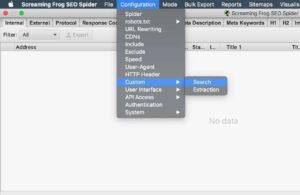I recently received an email from the Community Marketing Manager of a translation technology company. In her email, she explained that she’s asking a small group of individuals to write about the importance of technology and tools. She was particularly interested in learning about what technologies and tools have been most crucial to the success of my company and which of them I could not live without on a daily basis.
Her email definitely caught my attention; I think it’s a great topic since many of us depend on tools, technologies, gadgets, apps, and similar items to make our professional and personal lives more successful, exciting, and convenient each and every day. After reading her email I started to count the tools I use on a daily basis in my head, and I soon came to realize that there are actually quite a few I absolutely need to successfully operate my SEO and digital marketing agency.
For the purpose of this blog post, I decided to write about some of the technologies and tools I use on an initial call with a prospective customer interested in outsourcing their search engine optimization needs. With any new customer, most of the tools I use to begin with are actually free and allow me to get a quick overview of what’s going on with a website. If you are planning on using some of these after reading this article, please keep in mind that they are what they are…free. I’m always cautious when offered “free stuff” and I’m extremely careful when interpreting data that I get from free tools, and so should you. Regardless, I’m usually pretty satisfied with the information I get out of them and have found myself upgrading to paid versions extensive testing. I’m not explaining the following tools in great detail, but I will provide you with a big picture on how to put them to work for you too.
If you want to see the search engine optimization score of your website, then I invite you to use our complimentary SEO site audit tool. You’ll get a custom report in less than a minute:
What’s Your SEO Score?
Enter the URL of any landing page or blog article and see how optimized it is for one keyword or phrase.
Initial SEO Site Audit Meeting
The initial first phone call or meeting takes about 45-60 minutes and the following tools allow me to do a super quick SEO website analysis (aka SEO site audit) without having to spend too much of my time. Although I’m able to identify some key findings in a relatively short amount of time, I often recommend doing a full audit, in particular if I identify issues for which I’m not able to easily find the cause. Think of a full SEO site audit as a comprehensive medical check where you’ll walk away knowing exactly what the state of your personal health is. Professional SEO audits usually start at $1,000 and can cost up to $5,000 or even more depending on the level of depth and complexity of the resulting findings and recommendations report. A report usually ranges anywhere from 50-100 pages.
A quick website audit in a first phone call allows me to see the big picture of what I may get myself into with a potential new customer. I’m also able to provide the person interested in hiring an SEO company with a ballpark estimate at the end of the call, and I also know if the site may have been penalized for previously deployed “black hat” SEO practices such as unnatural link building. Learn more about Google’s Quality Guidelines here.
The following list highlights just a few of the tools I primarily use for performing a quick SEO website assessment during that first phone call:
Google Analytics
Google Analytics is a free tool by Google (there’s also a paid version of Google Analytics, but most small and medium sized business don’t need access to the premium version), and it requires me to be added as an admin or user in order for me to access the data I need. Google Analytics allows me to quickly review and identify the organic search trend for the target website, where users come from, how they engage with the site, and much more.
Google Webmaster Tools
Google Webmaster Tools is another free tool by Google, and it’s their way to communicate with webmasters and site owners. Google Webmaster Tools allows me to get a quick snapshot of what’s going on with the site I’m evaluating. The tool points out issues such as broken links, website errors, potentially malware on the backend of the site, and much more.
Are you interested in learning more about Google Analytics and Google Webmaster Tools? I’ll be teaching an “Introduction to Google Analytics” class on September 30, 2014 and a “Getting Started with Google Webmaster Tools” class on October 1, 2014 for BVSD Lifelong Learning in Boulder, Colorado.
HubSpot Marketing Grader
Marketing Grader by HubSpot is another free tool I rely on when reviewing a site on the fly. It allows me to see an overall score of the website I’m analyzing, and it also addresses individual sections, including blogging, social media, SEO, lead generation, and a quick snapshot of the website’s mobile performance.
SEOquake
This free plugin is a neat SEO analytic tool for Firefox, Chrome and Opera browsers. It allows me to view information about any site for a wide range of parameters such as Google PageRank, keyword density, if Flash or Frames are used, text to html ratio, if a robots.txt or an XML sitemap are present, and much more.
Woorank
Woorank is a great addition to SEOquake, and the web-based software provides me with additional useful information such as when a domain will expire, if there are broken links, mobile rendering, if there’s a custom 404 page, etc. Woorank claims that every day, more than 30,000 companies rely on its tool to analyze their websites; I’m definitely one of them.
Majestic SEO
I usually use the free version of Majestic SEO to check out a website’s backlink profile. Unfortunately, many website owners have engaged cheap overseas SEO agencies that promised them quick results. These results were usually achieved by massive, unnatural link building efforts and after Google’s recent algorithm updates, many of these sites lost all of their rankings and also got penalized by Google for not complying with their guidelines for webmasters. These penalties normally last anywhere from 3-24 months and can have a severe impact on a website’s overall performance. I’m very cautious when I see an unnatural link profile and usually try to stay away from working these potential customers.
Screaming Frog
The free version of Screaming Frog, a small desktop program, allows me to spider any website and evaluate a meta data including title, description, keywords, and alt tags. The free version of Screaming Frog will scan up to 500 pages of a website but after reviewing the quality and length of about 10-15 title and description meta tags, I usually know exactly where we stand.

Conclusion
I love doing SEO website audits; whether it’s a quick one on the fly or an extensive professional audit. It’s kind of like doing detective work, and I get to use and play with a variety of tools and technologies that allow me to produce something useful that could have a huge impact on a company’s bottom line. I’m constantly on the lookout for new cool tools and enjoy researching and testing these technologies.
I had a blast writing this article and hope that you’re able to take away some useful information from this blog post. Feel free to contact me if you’re interested in learning more about an SEO audit for your website.
